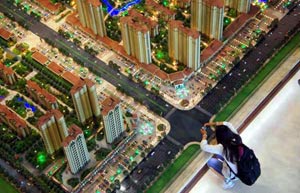To change, China has hard nuts to crack
(Xinhua) Updated: 2014-03-11 16:10BEIJING - China is the world's second largest economy, but for many, the Chinese dream is still far away. People have to wait too long to see a doctor. Family incomes are too low to raise and support both children and elderly parents.
That is why Premier Li Keqiang won applause when he said, "The fundamental goal of a government's work is to ensure that everyone lives a good life."
Li pledged to promote fairness and justice to "enable everyone to share the fruits of reform and development" while delivering his first government work report at the on-going national session of the National People's Congress (NPC), China's top legislature.
 |
|
Price drops reflect widening gap in property market |
More than 30 years of reform and opening up has boosted national wealth, but inequality in the distribution of social resources remains, with education, medicare and care for the elderly being the "hardest nuts to crack" during the next decade.
China's challenges
Ms. Wang in the city of Chengdu in southwest China's Sichuan province paid more than double the price for a house so her daughter would be eligible to enrol in a "key primary school" nearby.
The purchase enabled her to move her household registration, or hukou, and thus meet the policy requirement that public primary schools must admit students from local neighborhoods.
Many parents believe such "key" schools, with more funding and better teachers, are crucial for children not only getting into good high schools but also for their future prospects in life.
While parents like Wang are driving up property prices in school areas, most people cannot afford to buy a tiny room nearby.
Property prices in large cities are unaffordable for the majority of people.
An old and shabby house near the Beijing No.2 Experimental Primary School, one of the elite primary schools in Beijing, has exceeded 100,000 yuan ($16,290) per square meter.
- NHTSA says finds no 'defect trend' in Tesla Model S sedans
- WTO rare earth ruling is unfair
- Amway says 2014 China sales may grow 8%
- President Xi in Europe: Forging deals, boosting business
- CNOOC releases 2013 sustainability report
- Local production by Chery Jaguar Land Rover this year
- Car lovers test their need for speed in BMW Mission 3
- China stocks close mixed Monday

















